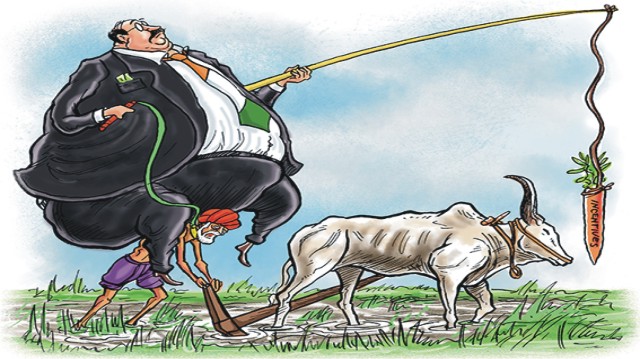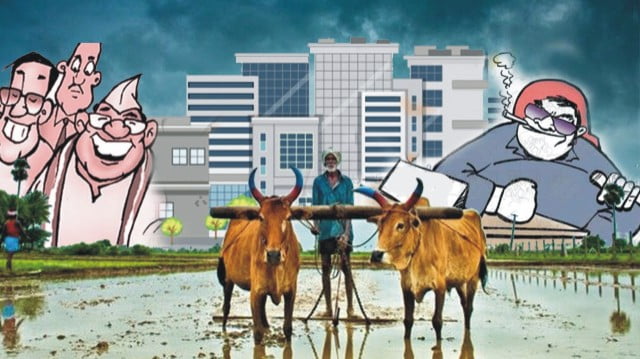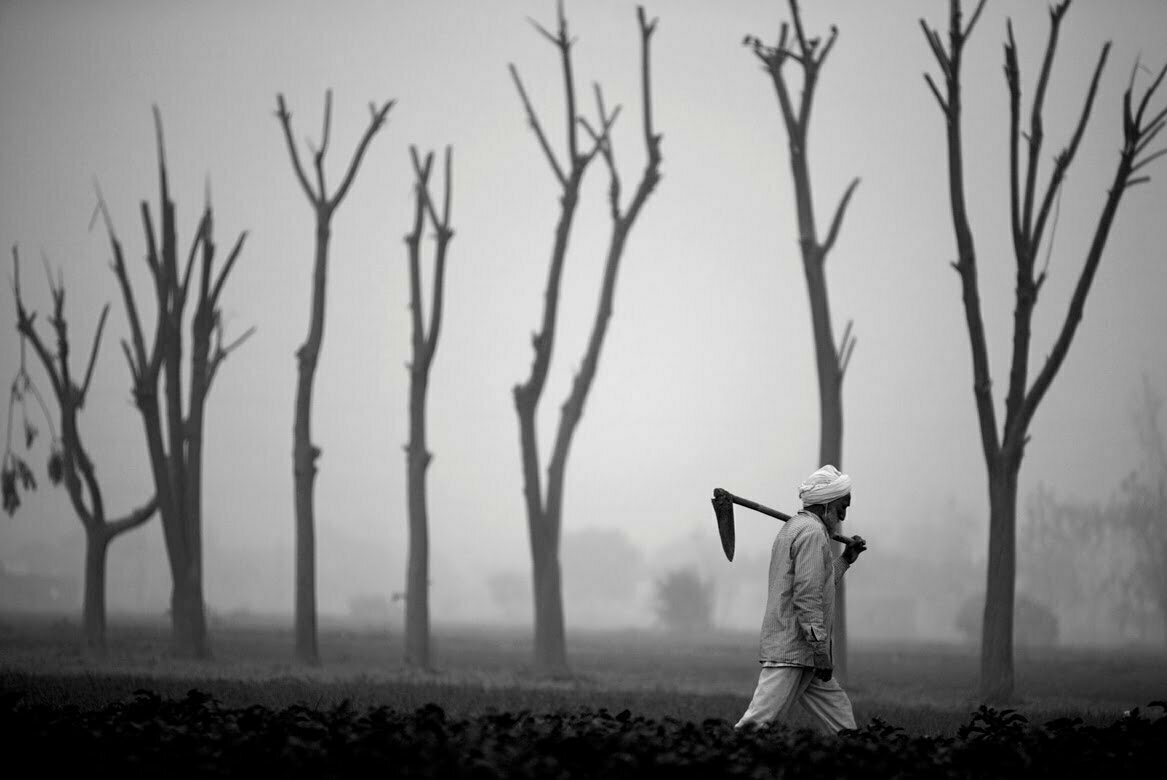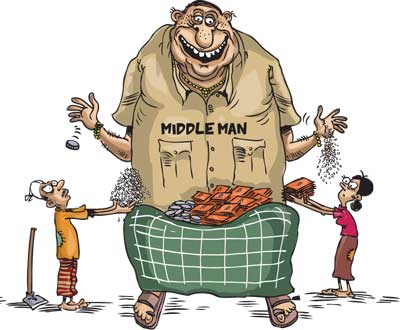

Some days back, I read an interesting tweet. Not only shocking, this tweet in Hindi by an IFS officer was also thought-provoking. It read something like this: “Please explain. I sold these oranges for Rs 17 per kg. And now here I am buying these at Rs 80 per kg in the market.” Along with the tweet, he posted a picture of oranges hanging from the tree.
This reminds me of another tweet, posted by a journalist-turned- organic farmer from Tamil Nadu. He had said that the best price he gets for coconuts that he sells is Rs 8 per piece. And he has no option but to buy a coconut at Rs 50 per piece from the market.
 Considering both the tweets, it becomes clear how the middlemen and the intermediaries in the supply chain very conveniently walk away with their share of profits leaving the farmers with not even enough to cover the cost of production. While the producer and the consumer suffer, the intermediaries laugh all the way to the bank.
Considering both the tweets, it becomes clear how the middlemen and the intermediaries in the supply chain very conveniently walk away with their share of profits leaving the farmers with not even enough to cover the cost of production. While the producer and the consumer suffer, the intermediaries laugh all the way to the bank.
The end consumer price for the coconut is more than six times the price farmers received. For oranges, the price difference is approximately five times of what the farmer was paid.
Interestingly, ever since the Commission for Agricultural Costs and Prices (CACP) began to estimate the agricultural prices, among the 7 determinants it has to look into is the demand and supply factor and also the likely impact the Minimum Support Price (MSP) has on the consumer of that product.
While both coconut and oranges is outside the purview of the CACP cost estimates, the fact that the intermediaries walk away with such a large chunk of the end consumer price is indicative of the failure to bring the markets under tighter regulations, including control over profit margins.

The moment I talk of the farmers receiving a pittance of the price the consumer is made to shell out, a vocal tribe of market enthusiasts open up a front.
“You can’t blame the markets. There are a multiple people engaged in the supply chain. You can’t reduce their margins,” are among the endless arguments that one is confronted with.
On the contrary, I have rarely heard of a voice that speaks out for the poor farmers who is invariably at the receiving end, a victim of the supply chain mechanism that has continued to exploit them ruthlessly over the years.
You can blame farmers for not being market-savvy, and because they had not gone in for value addition, they will continue to suffer the consequences. I have heard this argument time and again. Well, the question no one is willing to ask is that of the entire supply chains rakes in profits, why can’t a reasonable share also go to the producer of the raw material.
If consumers can pay a price of Rs 80 for oranges, why can’t the price for farmer be at least Rs 40 per kg? Isn’t a margin of Rs 40 per kg or 100 per cent of the farmer’s price, enough for the intermediaries? Moreover, if the middlemen have to walk away with 100 per cent or more margins for any product, I think we need to redefine what exploitation means.
 To put it straight, it’s not only in India that the markets have denied the rightful share of the end consumer price to farmers. The malaise runs much deeper and is global.
To put it straight, it’s not only in India that the markets have denied the rightful share of the end consumer price to farmers. The malaise runs much deeper and is global.
Let’s take a look. In the US, even the National Farmers Union complains that while the consumers paid a very high price for the annual Thanksgiving meals this year, almost none of that has been passed on to farmers. In a series of tweets, the NFU makes a comparison. The retail price of turkey, the main course of the Thanksgiving meal, is $ 1.99 per pound and the price farmer’s get is $0.06 per pound; the market price of frozen sweet corn is $2.59 against the farmer’s share of $0.44.
Similarly, the retail price of 5 pound bag of mashed potatoes is $5.99 and what the farmers get is $1.30. As you would observe, the margins that the intermediaries walk away with are huge. And no questions asked. This clearly shows how the farmer’s price is being squeezed; while the corporate profits are continuously on an upswing. The NFU vows to continue the fight for fair prices for farmers as well as consumers.
Now let’s move to the UK. In a report – Unpicking food prices: Where does your food pound go and why do farmers get so little? What the food charity Sustain finds out is equally shocking. Not only farmers, I think the consumers too need to understand what it means after all they are being fleeced by the trade.
The report based on a study by researchers at the City University in London, shows that after the retailers and the middlemen have taken their cut, what the farmer is left with is hardly one per cent of the profit. This is not a living income. It is even less than what a daily wage worker earns. No wonder, farmers in UK or for that matter in Europe are increasingly abandoning agriculture and moving out to non-farm activities. With such terribly low incomes, how does one expect farmers to survive?
The Sustain study had looked at five foodstuffs that people use daily – apple, cheese, beef burgers, carrots and bread. While the Sustain report calls for tightening of regulations and ensuring farmers get the rightful price they deserve, I think the time has come when world over the demand should be for price parity for farmers or what we in India call it as a guaranteed price.
Imagine, if the turkey farmer in the US had received a MSP for the birds he sells or the UK farmers gets a guaranteed price for the apples and cheese he markets or for that matter the horticulturist in India selling oranges getting a fixed and assured price, the producer of the raw and basic food commodities will not only become economically viable but this will surely bring in prosperity at the bottom of the pyramid. This is what is meant by sabka saath sabka vikas. We cannot continue to leave farmers to face the vagaries of the markets. Similarly, the markets cannot be allowed to fleece the consumers.
With all due respect to Shakespeare, ‘taming of the shrew’ has become an absolutely necessity. We have ignored the volatility of the markets for long now. A mechanism has to be evolved whereby the markets are made to be fair. The only way possible to do so is to provide farmers with a legally guaranteed MSP. ![]()
___________
Also Read:
Centre’s Opaque Auction Rules For Pulses Rip Off Govt Coffers, Help Millers Strike Rich
Need to amend laws like UAPA to provide for punishment for those who slap false cases
Global Arms Trade: Who are the real winners?
Why not 40 pc tickets for women in Punjab and elsewhere?
Punjab – How a deadly cocktail of Agri-Water-Energy nexus going to destroy it?
North Pole and the ideological conflict of RSS & Hindutva
Politics of Symbolism: Dalit Chief Ministers in India

Disclaimer : PunjabTodayTV.com and other platforms of the Punjab Today group strive to include views and opinions from across the entire spectrum, but by no means do we agree with everything we publish. Our efforts and editorial choices consistently underscore our authors’ right to the freedom of speech. However, it should be clear to all readers that individual authors are responsible for the information, ideas or opinions in their articles, and very often, these do not reflect the views of PunjabTodayTV.com or other platforms of the group. Punjab Today does not assume any responsibility or liability for the views of authors whose work appears here.
Punjab Today believes in serious, engaging, narrative journalism at a time when mainstream media houses seem to have given up on long-form writing and news television has blurred or altogether erased the lines between news and slapstick entertainment. We at Punjab Today believe that readers such as yourself appreciate cerebral journalism, and would like you to hold us against the best international industry standards. Brickbats are welcome even more than bouquets, though an occasional pat on the back is always encouraging. Good journalism can be a lifeline in these uncertain times worldwide. You can support us in myriad ways. To begin with, by spreading word about us and forwarding this reportage. Stay engaged.
— Team PT


Copyright © Punjab Today TV : All right Reserve 2016 - 2024 |